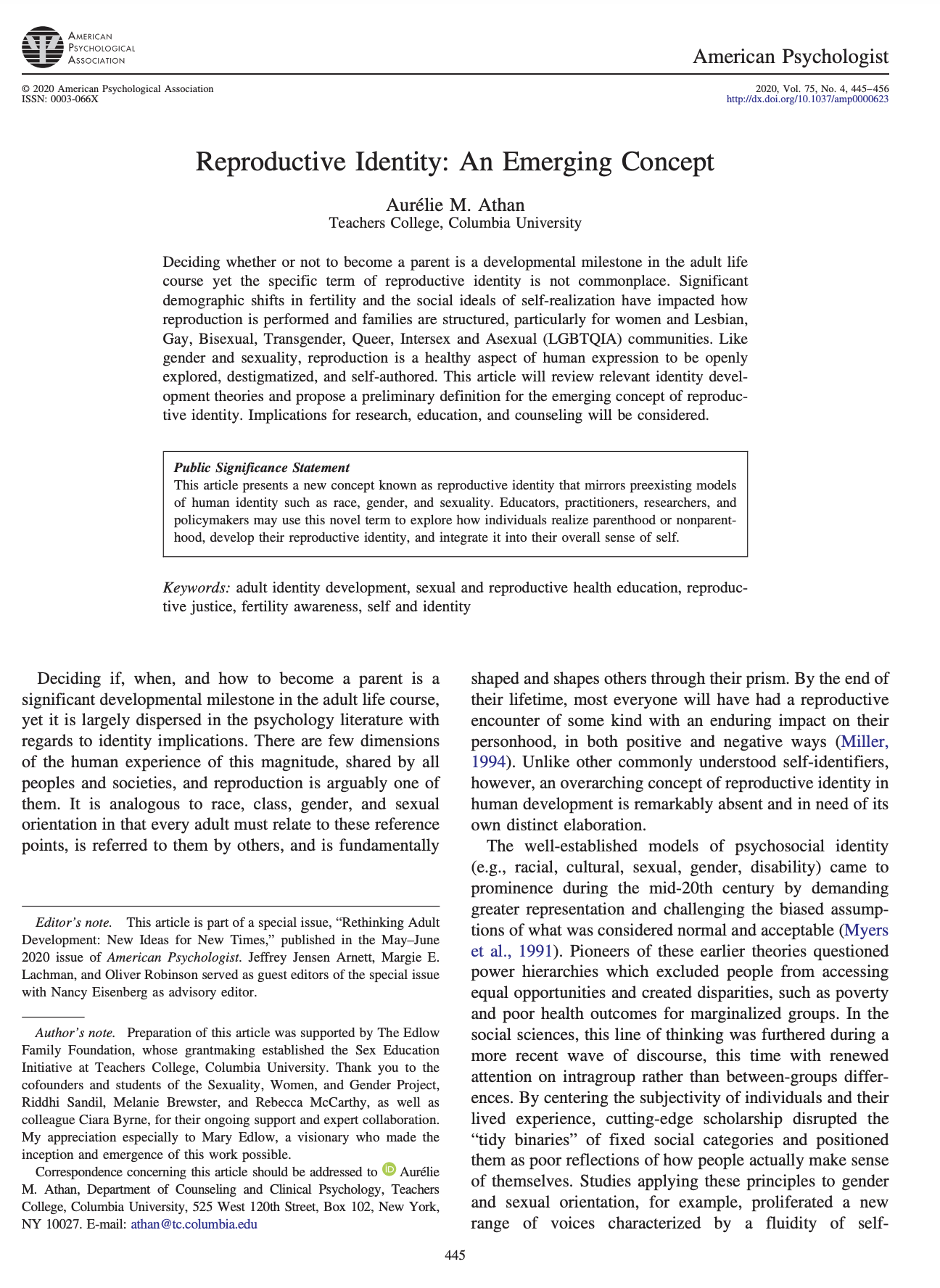Selected PublicationS
Dr. Aurelie Athan researches, writes, and teaches about the transition to motherhood and reproductive transitions in general for academic and lay audiences. She applies feminist-informed, positive psychology, and psychospiritual perspectives in addition to traditional clinical and psychoanalytic lenses to her scholarship.
Ecopsychology
“As primary caregivers of the next generation, the successful outgrowth of ecoconsciousness in mothers has implications for their children as well—both personal and planetary wellness at stake. When supporting the process of matrescence, it then must be reinterpreted not merely as a personal crisis of social adaptation, but also as a collective one of social evolution.”
American Psychologist
“…because the notion of agency is fundamental to both identity formation and reproduction, this emerging concept must sit on a foundation of reproductive justice that demands its equal access and representation... Just as reproductive autonomy has been expanded to include the dignity to procreate at will, as well as to respectfully constrain it, reproductive identity has the potential to advance this line of thinking even further to its largest scope to date and to secure it as an inalienable human right of all individuals to ultimately self-identify as they see fit.”
Feminism & Psychology
“Perhaps reviving the conceptual term matrescence, coined by and borrowed from the anthropologist Dana Raphael (1975), would be most apt within the land- scape of maternity. Much like adolescence, but nested in the niche of mid-life, it is an experience of dis-orientation and re-orientation marked by an acceleration of changes in multiple domains: physical (changes in body, hormonal fluctuations); psychological (e.g., identity, personality, defensive structure, self-esteem); social (e.g., re-evaluation of friendships, forgiveness of loved ones, gains in social status, or loss of professional status), and spiritual (e.g., existential questioning, re-commitment to faith, increased religious/spiritual practices).”
Pregnancy and childbirth are typically associated with pleasant ideals of motherhood and positive emotions, but research has shown that under some circumstances pregnancy can be seen as a stressful life event (Geller, 2004). To capture the complexity of how or why a woman becomes pregnant is a unique challenge. Although pregnancy has been conceptualized as a unitary construct, it is in fact multidimensional, and the antecedents to pregnancy a complicated story only recently told in the psychological literature. When a woman becomes a mother, she brings with her a priori a set of attitudes based on her intentionality of the pregnancy as well as a history of fertility-related behaviors and experiences. Difficulties in the formation of a family may begin with early reproductive health issues in the life span of the mother (e.g., endometriosis, fibroids, irregular menstruation), varying levels of infertility (e.g., use of IVF or egg/sperm donation), one or more perinatal losses (e.g., abortion, early term miscarriage, late-term neonatal death, stillbirth), and threatened gestations (e.g., high-risk). The interplay of a mother’s motivation for her current pregnancy and past reproductive complications may yield a new arena for clinicians to explore, and has the potential to raise much-needed questions with regard to the changing procreative lives of 21st century women.
Although spiritual awakening has been extensively documented in those having experienced religious conversion, drug rehabilitation, a significant loss, trauma, or acute illness, there is to borrow a phrase from Hill (2000), “a strange neglect” of spiritual experiencing as a topic of research in ordinary life transitions (Cartwright, 2001; Emmons, 2003; Hamilton & Jackson, 1998; Mahoney & Pargament, 2004). Language rich in symbols of transformation, transcendence, and rebirth has been historically more available to those suffering through ‘death- defying’ experiences (Neill, 2002; Papathanassoglou & Patiraki, 2003), rather than ‘life-affirming’ ones. The transition to motherhood, a ubiquitous form of quantum change, has not been explored in depth within a spiritual framework despite being universally described as a significant achievement of adulthood for a woman marked by acute redefinitions of self, reappraisals of lifestyle choices, and dramatic shifts in ways of thinking about intimacy, love, relationships, the world, and God (Madaras, 1999).
Unpublished Dissertation (2010): Postpartum Flourishing: Motherhood as an Opportunity for Positive Growth and Self-Development.




